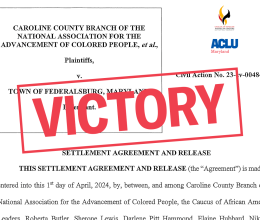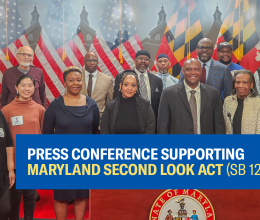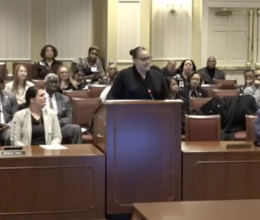
If criminal justice advocates are not vigilant, the Justice Reinvestment Initiative in Maryland could turn out to be the biggest misnomer in legislative history - where is the justice in a bill that raises criminal penalties and ignores racially disparate patterns in sentencing?
The JRI's purported object is to reduce both Maryland's prison population and state spending on prisons-two ambitious and laudable goals. By all accounts, Maryland is wasting precious taxpayer dollars on counterproductive corrections policies that put people in prison, disproportionately people of color, too often and for too long.
Unfortunately, the Senate Judicial Proceedings Committee amended the JRI bill (SB 1005/ HB 1312) to increase the maximum sentences for second-degree murder and kidnapping from 30 to 40 years-measures that neither reduce the prison population nor state spending. Of course, proponents of these measures will recount horrifying cases to justify raising those sentences, and they may be correct in their position. But, the fact of the matter is this-there were at least three bills introduced this session to raise these penalties, and countless in sessions past. If the General Assembly wants to take this up, there is ample opportunity. But, provisions to increase sentences should not be included in a bill intended to reduce incarceration.
And what is missing from the bill? We are long overdue to repeal mandatory minimum sentences, which result in stark racial disparities. According to the JRCC report, 81 percent of offenders sentenced to mandatory minimum sentences for drug crimes in FY2013 and FY2014 were Black. What's worse, mandatory minimum sentences are unlikely to yield any public safety benefit-research shows that long prison terms do not reduce recidivism.
How much money are we wasting to lock folks away for long terms-especially for drug offenses? How many school lunches for our students or accommodations for crime witnesses could that money buy? How many treatment beds for those with mental health or substance use disorder did we forego for the sake of appearing tough on crime? And when did tough on crime mean we couldn't be smart on crime?
Our leaders must repeal mandatory minimum sentences in order to move the needle forward on public safety and criminal justice reform. Marylanders cannot afford the luxury of delay-it has cost us too much already, in dollars and in our livelihoods.
Senate President Miller has correctly, and laudably, acknowledged that the bill needs some work. SB1005 / HB1213 could be groundbreaking. We have a real opportunity to reform the draconian criminal laws that have filled our prisons, emptied our coffers, left countless Marylanders unemployable, and demoralized our communities-especially communities of color. For now, however, it remains just that, an opportunity.







